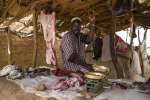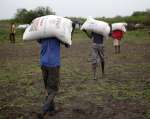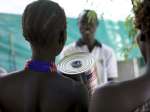- Text size
 |
|  |
|  |
| 
- Français
As food prices rise, refugees in Jamaica look to their own back yard
News Stories, 8 July 2008

KINGSTON, Jamaica July 8 (UNHCR) – The impact of rising food prices is being felt in households around the world. This is particularly true in the Caribbean Islands, where several countries are completely dependent on food imports despite the region's reputation as a tropical paradise.
Not so Jamaica, where a national holiday was recently marked with the slogan, "We Eat What We Grow." In a country blessed with abundant fertile soil and a people accustomed to working it, a group of refugees and asylum seekers is adding to the island's bounty.
In the back yard of a house rented by a faith-based charity, refugees and asylum seekers from countries as diverse and distant as Uganda and Myanmar are producing a cornucopia of vegetables blazing with colour as the rainy season begins in earnest.
Six months ago it was a very different picture. The plot of land was a tangle of overgrown weeds and creepers. Armed with little more than shovels and determination, and with an initial seed donation provided by the Justice Commission, a UNHCR partner, the group was soon reaping the rewards of their hard work, harvesting lettuce, tomatoes, pumpkin, corn and onions on a regular basis.
Ugandan asylum seeker, Jewel Praise Eden, proudly displayed the garden to a UNHCR visitor on mission recently to Jamaica. "I am proud of the fact that we are producing our own food. It is hard work but it so satisfying to see the vegetables grow," she said.
Clover Graham, UNHCR's honorary liaison in Jamaica, is one of the recipients of the garden's bounty. "Some weeks there is too much for the household to consume and that is when I get to take home some of the extra for my own table. The refugees are happy to be able to give something back to those that have helped them in Jamaica," said Graham.
The success of the back yard operation has not gone unnoticed. A new partner organization of the UN refugee agency – the Independent Jamaican Council for Human Rights – is now gearing up to supply seeds, tools and gardening gloves to other refugees in Kingston who have a patch of soil they could grow on as well as to those living in other locations around the island.
By Grainne O'Hara in Kingston, Jamaica
















































